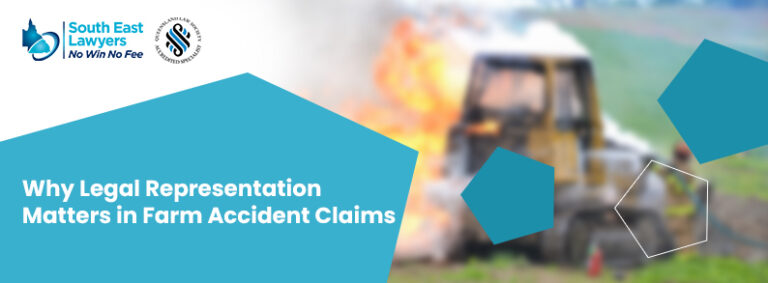Filing a workers’ compensation claim can be a confusing and stressful process, especially when you’re worried about how it might impact your employer. In Queensland, the workers’ compensation system is designed to protect both employees and employers. If you’re an injured worker seeking compensation for a work-related injury, understanding how this process affects your employer can provide peace of mind.
This article will explore what happens when a workers’ compensation claim is filed, how it might affect your employer’s workers compensation insurance, and what responsibilities employers have under the law. We’ll also discuss common misconceptions and provide practical advice for both employees and employers.
If you’re unsure about your rights or need more personalised guidance, South East Injury Lawyers is here to help. Our team is experienced in managing workers’ compensation claims and can support you through every step of the process.
Workers’ Compensation in Queensland
Workers’ compensation in Queensland is a no-fault system, meaning that an injured worker is entitled to compensation regardless of who caused the injury. The system is designed to provide support for employees who have been injured at work, covering medical expenses, lost wages, and rehabilitation costs.
Employers in Queensland are required to have workers’ compensation insurance to cover their employees. This insurance is provided either through WorkCover Queensland, the state’s primary insurer, or an approved insurer. The workers compensation insurance policies ensure that injured employees receive the necessary benefits without having to prove fault.
When an injured worker files a workers’ compensation claim, the employer must report the incident to WorkCover or their insurer and cooperate with any investigations. The employer’s role includes providing necessary documentation, supporting the injured employee in their recovery, and helping them return to work as soon as it is safe to do so.
At South East Injury Lawyers, we can help you navigate the complexities of the workers’ compensation system, ensuring you understand your rights and receive the compensation you’re entitled to.
What Happens When an Employee Files a Claim?
When an employee files a workers’ compensation claim in Queensland, there are specific steps that both the employer and the injured worker must follow. Here’s what typically happens:
- Notification and Reporting: The injured employee must notify their employer of the work-related injury as soon as possible. The employer then has an obligation to report the injury to WorkCover Queensland or their chosen approved insurer within eight business days.
- Investigation and Documentation: The employer may need to provide details about the incident, such as accident reports, witness statements, and any relevant workplace safety records. This information helps the insurer assess the claim’s validity.
- Claim Assessment: The insurer reviews the claim, considering factors like the nature of the injury, how it occurred, and whether it meets the criteria for workers’ compensation. The insurer may request further medical evaluations or documentation.
- Employer’s Role During Recovery: While the claim is being processed, the employer should support the injured worker, including facilitating access to medical treatment and planning for a return to work when appropriate. Employers are encouraged to implement an injury management plan to help the employee recover and reintegrate into the workplace.
- Impact on Workers’ Compensation Premiums: The number and severity of claims can affect an employer’s workers’ compensation insurance premiums. A higher claims history can lead to increased premiums, which is why many employers focus on workplace safety and proactive injury management.
By understanding these steps, both employees and employers can better navigate the claims process.
Potential Impacts on Employers
Filing a workers’ compensation claim not only affects the injured worker but can also have implications for the employer. Here are some of the potential impacts:
1. Financial Impact: One of the most immediate effects is on the employer’s workers’ compensation insurance premiums. If an employer has a high number of claims or if the claims are costly, their premiums may increase. This is because insurers view a high claims history as a risk factor.
2. Administrative Burden: Employers must manage additional paperwork and coordinate with WorkCover Queensland or other insurers during the claims process. This could require significant time and resources, particularly for smaller businesses without dedicated HR staff.
3. Workplace Disruption: An injured employee’s absence can disrupt workflow and productivity, especially if the worker plays a critical role. Employers may need to find temporary replacements or redistribute tasks among remaining employees, which can lead to increased stress and workload.
4. Legal Obligations: Employers have a legal duty to comply with workers’ compensation laws, including reporting injuries promptly and supporting injured workers’ recovery and return to work. Failing to meet these obligations can result in penalties or legal action.
Misconceptions About Filing a Workers’ Compensation Claim
There are several misconceptions about filing a workers’ compensation claim that can cause unnecessary worry for both employees and employers. Here are some common myths and their truths:
1. Employers Face Fines or Legal Action: A common misconception is that filing a claim will lead to fines or legal consequences for the employer. In reality, the workers’ compensation system in Queensland is designed to protect both parties. As long as the employer has followed safety regulations and reporting requirements, they are not typically subject to fines just because a claim is filed.
2. Employers Can Be Sued Personally: Another misconception is that employers can be personally sued for a work-related injury. The workers’ compensation insurance system generally provides coverage, shielding employers from direct lawsuits by employees for workplace injuries, unless there is proven gross negligence.
3. Filing a Claim Will Harm the Business: Some believe that a single claim can seriously harm a business’s reputation or financial stability. While frequent claims may impact insurance premiums, one properly managed claim is unlikely to have a lasting negative effect, especially if the employer shows a commitment to safety and supporting injured workers.
4. Employees Risk Their Jobs by Filing a Claim: Employees often fear that filing a claim could lead to retaliation or job loss. It’s important to know that it is illegal for employers to dismiss or penalise an employee for filing a legitimate workers’ compensation claim. Workers have the right to seek compensation without fear of negative repercussions.
For specific advice and support, consider contacting South East Injury Lawyers.
How Employers Can Support Employees During the Claim Process
Supporting an injured worker through the workers’ compensation claim process is not only beneficial for the employee but also helps maintain a positive workplace environment.
Employers should inform the injured employee about their rights, the steps involved in filing a claim, and any available support services. Keeping the lines of communication open helps reduce confusion and stress for the employee.
Employers should also ensure that the injured worker receives prompt and appropriate medical treatment. Assisting with transportation to medical appointments or providing information about approved healthcare providers can make a significant difference.
Collaborating with the injured employee, their healthcare provider, and the workers’ compensation insurer to create a safe and gradual return-to-work plan is crucial is an important step every employer in this position should take. This plan should consider the employee’s medical restrictions and aim to reintegrate them into the workplace as smoothly as possible.
It’s also a great idea to foster a culture that values safety and supports injured employees. This includes providing training on workplace safety, encouraging reporting of hazards, and ensuring all employees feel supported during their recovery.
By taking these steps, employers can not only help their employees recover more quickly but also minimise potential disruptions to the business.
The Role of WorkCover and Employer Insurance
In Queensland, WorkCover Queensland plays a pivotal role in the workers’ compensation system. As the primary insurer, WorkCover provides workers’ compensation insurance to most employers, ensuring that injured workers receive the benefits they are entitled to after a work-related injury.
When an employee is injured at work, the employer must report the injury to WorkCover or their chosen approved insurer. The insurer then assesses the claim to determine its validity and calculates the appropriate benefits, which may include coverage for medical expenses, lost wages, and rehabilitation.
Workers’ compensation insurance policies are designed to protect both employees and employers. For employees, they provide financial support during recovery. For employers, these policies offer protection against direct lawsuits from injured workers and ensure that workers’ compensation claims are handled by professionals, minimising the employer’s liability.
Additionally, WorkCover and other insurers help employers manage their claims history and provide resources for improving workplace safety, which can positively impact workers’ compensation premiums over time.
If you have questions about how these processes work, our worker’s compensation lawyers can provide expert advice and support.
Long-term Considerations for Employers
Employers must consider the long-term impacts of workers’ compensation claims on their business. Frequent claims or serious injuries can have several lasting effects:
1. Impact on Insurance Premiums: We touched on this earlier, but a high number of claims can lead to increased workers’ compensation insurance premiums. Insurers may view businesses with a poor claims history as higher risk, resulting in higher costs for coverage. Maintaining a safe workplace can help manage these premiums over time.
2. Reputation and Employee Morale: How an employer handles workers’ compensation claims can affect their reputation among current and potential employees. Demonstrating a commitment to safety and supporting injured workers fosters a positive workplace culture, which can boost morale and reduce turnover.
3. Legal Compliance and Avoiding Penalties: Employers are legally required to comply with workers’ compensation laws, including promptly reporting injuries and supporting the injured worker’s recovery. Failure to meet these obligations can lead to fines, legal action, and increased scrutiny from the workers compensation regulator.
4. Workplace Safety Improvements: Employers should view claims as opportunities to improve workplace safety. Analysing the causes of accidents and implementing better safety practices can prevent future injuries and reduce the likelihood of further claims.
Get the Support You Need Today
Filing a workers’ compensation claim is your right if you’ve been injured at work, and understanding how this process affects both you and your employer can bring about peace of mind. While there may be some impact on your employer’s workers’ compensation insurance premiums and administrative responsibilities, the system is designed to protect both parties.
Employers benefit from having insurance that covers claims, shielding them from direct financial liability and providing resources to improve workplace safety. For employees, it’s important to know that you can file a claim without fear of retaliation or job loss.
If you’re unsure about your rights or how a claim might impact your employer, seeking professional advice is a smart step. At South East Injury Lawyers, we can help you navigate the complexities of workers’ compensation claims, ensuring you get the support and compensation you deserve. Contact us today for a free initial consultation and take the first step towards understanding your rights and options.






